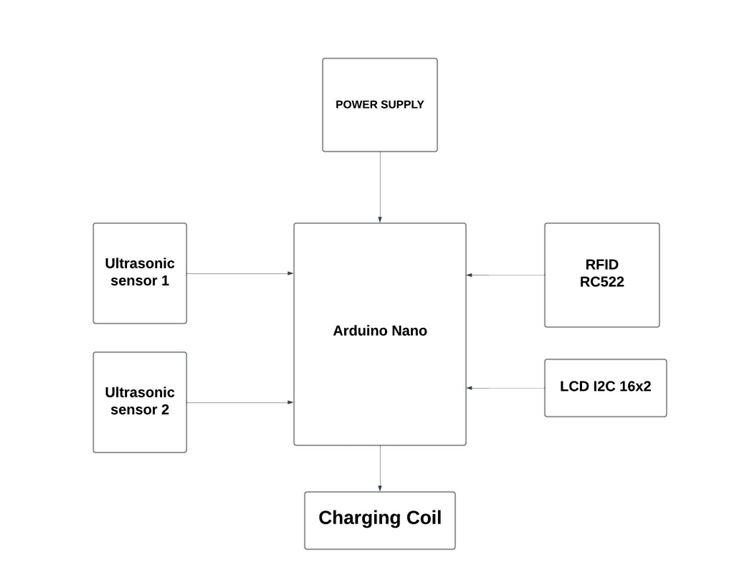🔹 BRIEF INTRODUCTION
The Smart Parking System with Wireless Power Transmission and RFID Payments is an IoT-based solution designed to improve urban parking management. The system identifies users via RFID cards, monitors parking slot availability using ultrasonic sensors, and calculates parking duration and charges. A standout feature is wireless power transmission via copper coils, where an LED indicates when power is successfully transferred, simulating electric vehicle charging. It combines automation, digital payments, and sustainable energy transfer into one compact prototype.
🔹 Components List
| Component |
Quantity |
Function |
| Arduino Uno/Nano |
1 |
Main controller for system logic |
| MFRC522 RFID Module |
1 |
User authentication and tag scanning |
| RFID Tags (Keycards) |
2+ |
Unique user identification |
| Ultrasonic Sensor (HC-SR04) |
2 |
Detects presence of vehicles in slots |
| LiquidCrystal_I2C (16x2) |
1 |
Displays status, time, and charges |
| Copper Coils (TX & RX) |
2 |
Wireless power transmission |
| LED |
1 |
Indicates if power is being received |
| MOSFET or Transistor |
1 |
Controls coil switching |
| Resistors, Capacitors |
As needed |
For circuit stability |
| Power Supply (5V or 9V) |
1 |
Powers the entire system |
| Jumper Wires & Breadboard |
As needed |
For connections |
BLOCK DIAGRAM

WORKING
When the system starts, the LCD displays "System Started" and prompts the user to scan their RFID tag. Two ultrasonic sensors constantly monitor the distance in front of each parking slot to determine whether a slot is empty (E) or filled (F). This status is updated every few seconds and displayed on the LCD, giving real-time availability. A user initiates their parking session by scanning an RFID tag. The system identifies the user based on the tag’s UID and starts a timer in the background. Simultaneously, if the vehicle is parked in a slot equipped with a wireless power receiver coil, the transmitter coil installed below begins to transmit power wirelessly using inductive coupling. An LED lights up to indicate that wireless power is actively being transmitted to the parked vehicle (or its battery circuit), simulating a real-time electric vehicle charging environment. Throughout the parking session, the system logs the duration of the stay in seconds. Once the user returns and scans their RFID tag again, the system stops the timer, calculates the total time spent, and multiplies it by a predefined rate (e.g., ₹2 per minute) to determine the final charge. This charge and total time are displayed on the LCD for a few seconds before resetting the slot for the next vehicle. The wireless power LED turns off automatically when the user ends their session, indicating power has stopped flowing. The entire system runs without any physical input (no buttons or switches), relying on RFID, distance sensing, and wireless energy transfer, making it ideal for contactless and automated parking and payment systems in smart cities.
IMAGES USED ARE ONLY FOR SAMPLE PURPOSES!!!!

.svg)